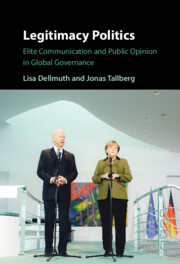Book contents
- Legitimacy Politics
- Legitimacy Politics
- Copyright page
- Contents
- Figures
- Tables
- Acknowledgments
- Abbreviations
- 1 Introduction
- 2 Legitimacy and Communication in Global Governance
- 3 A Theory of Elite Influence and Popular Legitimacy
- 4 Communication by Global Elites
- 5 Communication by Domestic Elites
- 6 Communication about Procedure and Performance
- 7 Communication about Authority and Purpose
- 8 Conclusion
- References
- Index
- References
References
Published online by Cambridge University Press: 12 January 2023
- Legitimacy Politics
- Legitimacy Politics
- Copyright page
- Contents
- Figures
- Tables
- Acknowledgments
- Abbreviations
- 1 Introduction
- 2 Legitimacy and Communication in Global Governance
- 3 A Theory of Elite Influence and Popular Legitimacy
- 4 Communication by Global Elites
- 5 Communication by Domestic Elites
- 6 Communication about Procedure and Performance
- 7 Communication about Authority and Purpose
- 8 Conclusion
- References
- Index
- References
Summary
- Type
- Chapter
- Information
- Legitimacy PoliticsElite Communication and Public Opinion in Global Governance, pp. 227 - 255Publisher: Cambridge University PressPrint publication year: 2023
- Creative Commons
- This content is Open Access and distributed under the terms of the Creative Commons Attribution licence CC-BY-NC-ND 4.0 https://creativecommons.org/cclicenses/



